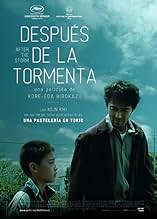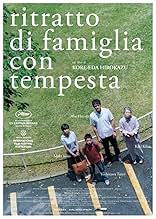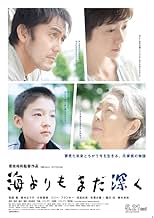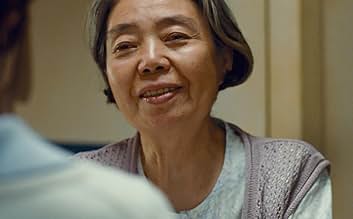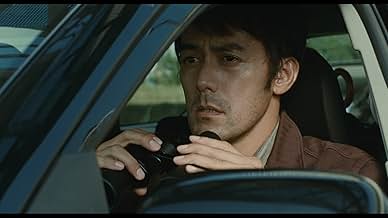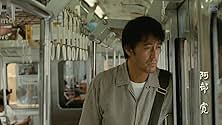IMDb-BEWERTUNG
7,4/10
13.710
IHRE BEWERTUNG
Nach dem Tod seines Vaters quält sich ein Privatdetektiv mit Unterhaltszahlungen ab und damit, wieder Zugang zu seinem Sohn und seiner Ex-Frau zu finden.Nach dem Tod seines Vaters quält sich ein Privatdetektiv mit Unterhaltszahlungen ab und damit, wieder Zugang zu seinem Sohn und seiner Ex-Frau zu finden.Nach dem Tod seines Vaters quält sich ein Privatdetektiv mit Unterhaltszahlungen ab und damit, wieder Zugang zu seinem Sohn und seiner Ex-Frau zu finden.
- Auszeichnungen
- 2 Gewinne & 13 Nominierungen insgesamt
Empfohlene Bewertungen
In a relatively short time span, I've seen three films by Hirokazu Kore-Eda, and I'm planning to see many more. It seems most of his work is focused on family relations, and his films are touching, heartfelt real life dramas. The raw material for Kore-Eda's films are emotions, and the ways his protagonists express them in words and by their behaviour.
Like the two other films I've seen ('Our Little Sister' and 'Like Father, Like Son'), 'After the Storm' deals with parents, children, grandchildren and siblings. In this case, the central character is a divorced writer with financial problems, who has taken a job as a private detective to make ends meet. To keep up appearances, he pretends the job is a way of doing research for a new novel, but everyone knows there is no book.
His young son is very fond of his grandma, so they go visit her. But typhoon number 24 is approaching fast, and when the writer's ex-wife comes to the apartment to pick up the boy, the bad weather conditions prevent them from going home. They have to spend the night at the grandmother's house, just as if they were a normal family. And in a way, they almost are, during that one special night. After the storm, everything has returned to normal, except that the four of them are closer than they were before. The last shot is full of symbolism: the sun shines, but several broken and abandoned umbrellas are the witnesses of the stormy night.
It takes superior film making skills to turn such a story into a good movie. The emotions have to be measured out with care, in order to prevent it from turning into a tearjerker. The dialogue has to be natural, but at the same time not superficial. And the actors have to be completely believable. Just leave it to Kore-Eda: every scene is a joy to watch. It's those little things that make his characters so real: when his mother starts pleading him to stay the night, the writer says: oh, mother, please don't use this voice like you're almost dying. These are exactly the things mothers and sons say to each other, with a mix of affection and irritation.
The director also gives little hints and references which you only fully understand after a while. At the very beginning, the writer's mother remarks that a neighbour has moved to a bigger house. Only much later we learn that this has always been her own dream, and that she's tired of her own tiny apartment. I think it takes a second viewing to get all the tiny hints sprinkled throughout the story.
Are we what we hoped to be? And what was it exactly we hoped to be? Those are the questions 'After the Storm' deals with. There are no clear cut answers. But thinking about the questions makes this film worthwhile.
Like the two other films I've seen ('Our Little Sister' and 'Like Father, Like Son'), 'After the Storm' deals with parents, children, grandchildren and siblings. In this case, the central character is a divorced writer with financial problems, who has taken a job as a private detective to make ends meet. To keep up appearances, he pretends the job is a way of doing research for a new novel, but everyone knows there is no book.
His young son is very fond of his grandma, so they go visit her. But typhoon number 24 is approaching fast, and when the writer's ex-wife comes to the apartment to pick up the boy, the bad weather conditions prevent them from going home. They have to spend the night at the grandmother's house, just as if they were a normal family. And in a way, they almost are, during that one special night. After the storm, everything has returned to normal, except that the four of them are closer than they were before. The last shot is full of symbolism: the sun shines, but several broken and abandoned umbrellas are the witnesses of the stormy night.
It takes superior film making skills to turn such a story into a good movie. The emotions have to be measured out with care, in order to prevent it from turning into a tearjerker. The dialogue has to be natural, but at the same time not superficial. And the actors have to be completely believable. Just leave it to Kore-Eda: every scene is a joy to watch. It's those little things that make his characters so real: when his mother starts pleading him to stay the night, the writer says: oh, mother, please don't use this voice like you're almost dying. These are exactly the things mothers and sons say to each other, with a mix of affection and irritation.
The director also gives little hints and references which you only fully understand after a while. At the very beginning, the writer's mother remarks that a neighbour has moved to a bigger house. Only much later we learn that this has always been her own dream, and that she's tired of her own tiny apartment. I think it takes a second viewing to get all the tiny hints sprinkled throughout the story.
Are we what we hoped to be? And what was it exactly we hoped to be? Those are the questions 'After the Storm' deals with. There are no clear cut answers. But thinking about the questions makes this film worthwhile.
Kore-eda is a renowned Japanese director for personable family dramas. His work in 'Still Walking' and 'Like Father, Like Son' (although yet to see) prove he is a capable writer when dealing with common family experiences. Marital woes, grief, father and son relationships. The list goes on. This being my first Kore-eda experience, I was unsure which angle to approach this blistering drama with. Regardless, no matter how I set my mind, it was an evocative and multi-layered drama with a masterful level of maturity. A novelist turned private detective, who is struggling for money due to a gambling addiction, coincidentally finds himself stuck at his mother's house overnight when a typhoon hits Japan. At the time the storm hits, his ex-wife and son are also there and spend the night within this claustrophobic environment.
Metaphorically speaking, the typhoon is a vivid representation of the estranged behaviour from both Ryota and Kyoko. Their differences splitting the family apart with such velocity. Yet, there is no hatred. No malice. And that is what I adore about Kore-eda's approach, it doesn't conform to typical clichés. He treats the audience like adults and executes a realistic family drama without needing any overly dramatic plots. Just two characters talking, with personable dialogue that has a surprising amount of wit, attempting to reconcile their differences for the betterment of themselves and their son. The storm acts as plot device for Ryota, allowing him to use the natural disaster to bond with his son. Then, once it subsides, life continues. A profound statement for most families.
Kore-eda explores various areas of urban Japanese culture, especially gambling and poverty, that enables this drama to be multi-layered. But what really cemented his masterful screenplay was just how it personal it was to him. Immediately the characters are bursting with dimensionality, enabling us to invest the time into their stories. Whilst also dealing with the scope of life, by indicating that "grown-ups cannot live only with love". A fascinating character study of a man who's personal ambitions get in the way of living life now. Though the narrative structure is not as fluid as the rain pummelling down from the storm, due to the abrupt transition between the first half before the storm and the second half, it still remains a rigid story.
This is helped by Abe's resourceful performance which was incredibly nuanced. Ryota is a complicated character, and Abe executed his complexions with ease. The late Kiki also gave a noteworthy performance as his mother, offering various lessons on life as she attempts to fix broken bonds within her family. Yamasaki's cinematography was gorgeous, cleanly enveloping you in Japan's natural and urban beauty. Kore-eda also frequently utilised long takes of unedited dialogue exchanges which subconsciously draws you into the drama.
Another small criticism would be the underutilisation of Kyoko's new boyfriend, whom of which could've been used more effectively to display her inner conflict for starting a new family or mending the existing bonds for the sake of her son. Small nitpicks here and there for what is a genuinely mature drama that felt both personal and personable, bolstered by sterling performances and a valuable screenplay. Am excited to see what Kore-eda has in store for us in the future. Oh, and bonus points for showcasing 'Taiko No Tatsujin' (I frickin' love that game...).
Metaphorically speaking, the typhoon is a vivid representation of the estranged behaviour from both Ryota and Kyoko. Their differences splitting the family apart with such velocity. Yet, there is no hatred. No malice. And that is what I adore about Kore-eda's approach, it doesn't conform to typical clichés. He treats the audience like adults and executes a realistic family drama without needing any overly dramatic plots. Just two characters talking, with personable dialogue that has a surprising amount of wit, attempting to reconcile their differences for the betterment of themselves and their son. The storm acts as plot device for Ryota, allowing him to use the natural disaster to bond with his son. Then, once it subsides, life continues. A profound statement for most families.
Kore-eda explores various areas of urban Japanese culture, especially gambling and poverty, that enables this drama to be multi-layered. But what really cemented his masterful screenplay was just how it personal it was to him. Immediately the characters are bursting with dimensionality, enabling us to invest the time into their stories. Whilst also dealing with the scope of life, by indicating that "grown-ups cannot live only with love". A fascinating character study of a man who's personal ambitions get in the way of living life now. Though the narrative structure is not as fluid as the rain pummelling down from the storm, due to the abrupt transition between the first half before the storm and the second half, it still remains a rigid story.
This is helped by Abe's resourceful performance which was incredibly nuanced. Ryota is a complicated character, and Abe executed his complexions with ease. The late Kiki also gave a noteworthy performance as his mother, offering various lessons on life as she attempts to fix broken bonds within her family. Yamasaki's cinematography was gorgeous, cleanly enveloping you in Japan's natural and urban beauty. Kore-eda also frequently utilised long takes of unedited dialogue exchanges which subconsciously draws you into the drama.
Another small criticism would be the underutilisation of Kyoko's new boyfriend, whom of which could've been used more effectively to display her inner conflict for starting a new family or mending the existing bonds for the sake of her son. Small nitpicks here and there for what is a genuinely mature drama that felt both personal and personable, bolstered by sterling performances and a valuable screenplay. Am excited to see what Kore-eda has in store for us in the future. Oh, and bonus points for showcasing 'Taiko No Tatsujin' (I frickin' love that game...).
Koreeda always knows how to make deep character portrayals that are calm on the surface but roiling underneath.
Most films these days do not have something to 'say' anymore. They don't have a deeper meaning. And if they do, it's mostly superficial or so complex you don't really understand. 'After the Storm' by Hirokuzu Kore-eda has something to say, it's like a condensed moment of life. You will be dumbstruck by it's beauty.
The story deals with Ryota, struggling with financial problems, and trying to keep contact with his son after divorcement. He works as a private detective, spying on affairs and looking for lost cats while his real passion lies in writing literature.
The entire film is built around a central story part where they take shelter from a taifun, it involves scenes of such profound beauty, you will be moved to tears. The beauty lies in the things that are not spoken out, yet linger in the air like rain: the missed opportunities to be happy, love gone by and yet - still there.
To say the film deals with abandoned dreams in the face of reality is wrong, it's the contrary. The film says: If you keep waiting for beauty in life, you will not realize that it has already arrived. Just not the way you thought it would.
The story deals with Ryota, struggling with financial problems, and trying to keep contact with his son after divorcement. He works as a private detective, spying on affairs and looking for lost cats while his real passion lies in writing literature.
The entire film is built around a central story part where they take shelter from a taifun, it involves scenes of such profound beauty, you will be moved to tears. The beauty lies in the things that are not spoken out, yet linger in the air like rain: the missed opportunities to be happy, love gone by and yet - still there.
To say the film deals with abandoned dreams in the face of reality is wrong, it's the contrary. The film says: If you keep waiting for beauty in life, you will not realize that it has already arrived. Just not the way you thought it would.
Remarkable consistency in delivering great dramas. If you are a drama film fan without the language barrier, then you must have seen at least a couple of films of Hirokazu Koreeda. Less than a year ago I saw his new arrival 'Our Little Sister'. Despite not overwhelmingly impressed with that, I won't say that I did not enjoy it. I always fascinated with the realistic portrayal, but the points should be executed so well than leaving empty scenes and dialogues, and calling it an art film. This one was much better. The first impression was okay, but after giving some time between my watch and writing this review, I kind of started to like it more.
First of all, this story was not new for me. I have already seen a few similar themed films from other parts of the world, particularly in Hollywood. But none of them were as serious as this one while narrating its tale. The storyline was simple, entirely focused on a family, fighting on stumbling marriage. It was a long introduction, particularly aimed at a father, like how he messed up in his life with gambling. But opening few minutes made him look like a man of example. Only in the following event you would know how deep his troubles are.
Other than his family, his work field was introduced to us. Being a writer, but for a few quick bucks working as a private eye on his part time, he misuses the opportunity with his loyal friend. Once the film reaches the half way mark, the focus shifts back to the family where the remaining story takes place. It was a stormy day and they all gather in his mother's apartment. This is where everything will be cleared out, whether the marriage will be saved or not. But the mother's one final push as it seems planned perfectly, would it deliver a result is what you should watch it to learn.
❝I wonder why it is that men can't love the present. Either they just keep chasing whatever it is they've lost, or they keep dreaming beyond their reach.❞
You can't doubt Hiroshi Abe's presence. He was perfect along with Kirin Kiki, whose a few films I've seen before, but only started to notice recently with her amazing performance from 'Sweet Bean'. The casting looked great, and the locations. I always like films about elderly people, especially to highlight their struggle. And most of the Japanese films I have seen on that concept were just like the way I wanted. Maybe because there are lots of aging people in Japan than anywhere else. Just kidding.
Obviously dialogues are very important for a film and there were many good lines spoken. At one point in the final stage, it flips towards sentiments. Very touching conversation, particularly coming from an old and experienced woman, which is definitely worth taking heed. This is a family film. Despite about a marriage crisis, there is no speculation, like twist and turns. Interesting enough with its plain narration. True to its title and when the title part comes into play, that's where it gets its peak. With its nearly two hours runtime, the pace was acceptable, but patience needed for those got trouble with long films.
This is the film about our life, that we can try for what we want to be, but achieving it not easy, not everybody would succeed that. Accepting the fact, as life my go on was the message. Incredible writing and direction. Feels like straight out of a book, it's an original screenplay though. Surely you don't want to miss this film, from this director. Because if you do, it is equal to failing to watch the latest Woody Allen film. Only he's a Japanese version. My final words are the director already made his masterpiece(s), but still it is near to one compared to the international cinemas. So I'm not saying it is a must, but surely worth a try.
7½/10
First of all, this story was not new for me. I have already seen a few similar themed films from other parts of the world, particularly in Hollywood. But none of them were as serious as this one while narrating its tale. The storyline was simple, entirely focused on a family, fighting on stumbling marriage. It was a long introduction, particularly aimed at a father, like how he messed up in his life with gambling. But opening few minutes made him look like a man of example. Only in the following event you would know how deep his troubles are.
Other than his family, his work field was introduced to us. Being a writer, but for a few quick bucks working as a private eye on his part time, he misuses the opportunity with his loyal friend. Once the film reaches the half way mark, the focus shifts back to the family where the remaining story takes place. It was a stormy day and they all gather in his mother's apartment. This is where everything will be cleared out, whether the marriage will be saved or not. But the mother's one final push as it seems planned perfectly, would it deliver a result is what you should watch it to learn.
❝I wonder why it is that men can't love the present. Either they just keep chasing whatever it is they've lost, or they keep dreaming beyond their reach.❞
You can't doubt Hiroshi Abe's presence. He was perfect along with Kirin Kiki, whose a few films I've seen before, but only started to notice recently with her amazing performance from 'Sweet Bean'. The casting looked great, and the locations. I always like films about elderly people, especially to highlight their struggle. And most of the Japanese films I have seen on that concept were just like the way I wanted. Maybe because there are lots of aging people in Japan than anywhere else. Just kidding.
Obviously dialogues are very important for a film and there were many good lines spoken. At one point in the final stage, it flips towards sentiments. Very touching conversation, particularly coming from an old and experienced woman, which is definitely worth taking heed. This is a family film. Despite about a marriage crisis, there is no speculation, like twist and turns. Interesting enough with its plain narration. True to its title and when the title part comes into play, that's where it gets its peak. With its nearly two hours runtime, the pace was acceptable, but patience needed for those got trouble with long films.
This is the film about our life, that we can try for what we want to be, but achieving it not easy, not everybody would succeed that. Accepting the fact, as life my go on was the message. Incredible writing and direction. Feels like straight out of a book, it's an original screenplay though. Surely you don't want to miss this film, from this director. Because if you do, it is equal to failing to watch the latest Woody Allen film. Only he's a Japanese version. My final words are the director already made his masterpiece(s), but still it is near to one compared to the international cinemas. So I'm not saying it is a must, but surely worth a try.
7½/10
Wusstest du schon
- WissenswertesAlbeit released later, this film wrapped earlier than Koreeda's previous film Unsere kleine Schwester (2015). The month-and-a-half filming of After the Storm took place starting in May 2014 in between the production of Our Little Sister, which was shot throughout a year.
- Zitate
Shinoda Yoshiko: I wonder why it is that men can't love the present. Either they just keep chasing whatever it is they've lost... or they keep dreaming beyond their reach.
- VerbindungenReferences Mein Nachbar Totoro (1988)
- SoundtracksShinkokyû
Music and lyrics by Takashi Nagazumi
Performed by Hanaregumi
Courtesy of Victor Records and Speedstar Records
Top-Auswahl
Melde dich zum Bewerten an und greife auf die Watchlist für personalisierte Empfehlungen zu.
- How long is After the Storm?Powered by Alexa
Details
- Erscheinungsdatum
- Herkunftsland
- Offizieller Standort
- Sprache
- Auch bekannt als
- Después de la tormenta
- Drehorte
- Kiyose, Tokio, Japan(Train station)
- Produktionsfirmen
- Weitere beteiligte Unternehmen bei IMDbPro anzeigen
Box Office
- Bruttoertrag in den USA und Kanada
- 272.132 $
- Eröffnungswochenende in den USA und in Kanada
- 27.880 $
- 19. März 2017
- Weltweiter Bruttoertrag
- 5.382.886 $
- Laufzeit1 Stunde 58 Minuten
- Farbe
- Sound-Mix
- Seitenverhältnis
- 1.85 : 1
Zu dieser Seite beitragen
Bearbeitung vorschlagen oder fehlenden Inhalt hinzufügen



